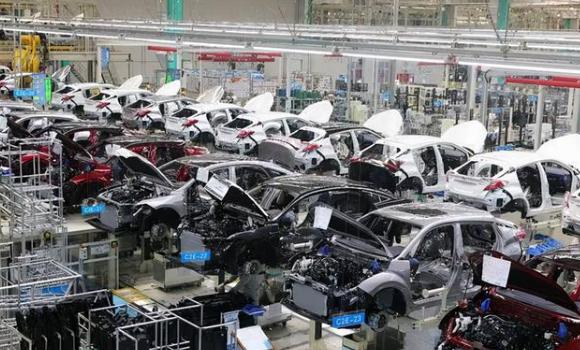A few days ago, Hitachi's auto parts subsidiary, Hitachi Astimo, disclosed the problem of quality inspection violations. The company acknowledged irregularities such as improper conduct in the quality inspection of the brake and suspension systems, involving a total of 57,000 brake parts for operating conditions and about 10 million suspension parts. Moreover, this misconduct began in 2000 and has continued for more than 20 years from now. In addition, these unqualified products have been delivered to 16 japanese and foreign automobile manufacturers and motorcycle manufacturers such as Toyota, Nissan, Honda, and Mazda. In the past 20 years, 16 companies, that is, many japanese cars that are now serving in China, have used these fake brakes. Lie, be sure to solve the problem. So the company's cadres bowed their heads and apologized in the spirit of Japan's "bowing their heads", saying: "The improper behavior occurred because the workers did not realize the importance of testing, and these unqualified products did not cause safety problems." The brakes only needed to be bowed, and Hitachi Astimo's attitude was absolutely amazing.

In fact, regarding the impact of counterfeiting on cars, this is not the first time that it has appeared in Japanese companies. Just like in 2016, Japan's Mitsubishi Group falsified 25 years of deflagration fee data; in 2017, Nissan Motor required unqualified inspectors to conduct a final inspection of the car's factory; in 2018, Japan's KYB Industrial Co., Ltd. tampered with performance testing record data with shock absorbers and shock absorbers. In short, all kinds of falsehoods, all kinds of apologies. If the massive camouflage that has lasted for years to decades is exposed, the cadres of Japanese companies will apologize. No false problem can be solved by bowing. If there is, figure out one more. At that time, the Japanese "craftsmen" were gradually becoming "bowing craftsmen". By the way, during this period, Toyota, which has strict requirements for the quality of parts, announced that it would use defective parts to build cars. Supposedly, camouflage and negative information are constantly emerging, but the reputation of Japanese cars should be getting worse and worse. What this means, reflected in the data, is that sales are getting worse and worse. However, if Jiang Ge checks the sales of Domestic Japanese cars, he will find that Japanese cars are selling more and more. As of 2017, Japanese cars have exceeded 4 million for five consecutive years, close to the market share of German cars.
Seeing this, many netizens are very confused. Obviously, there are many fakes and negative aspects, why has the reputation of Japanese cars in China been very good, and sales are also very good? In fact, Jiang Ge said that Japanese counterfeiting also has a good reputation, there may be the following two major reasons. The first is the blessing of the joint venture faith. Although domestic production is getting better and better with the development of technology, consumers still have preconceived notions that the quality of joint venture cars is better than that of joint venture companies with a longer history. In particular, Japanese cars with excellent reliability and durability have become myths and are considered to be the most stable representatives of quality. Therefore, even if there is a problem of counterfeiting, people who have confidence in the joint venture will say that the standard of daily orders is higher, and the quality of counterfeiting is better than the usual quality. Under such a religious brainwashing, the good reputation of the Japanese system naturally stands together. Moreover, this belief has led some consumers to ignore the japanese product problem. The most typical examples are the "a-bar event" and the "oil event". The same B-pillar problem, which appears on models such as passats and filters, will also be nailed to the pillar of shame, and it is still impossible to turn over.
The same is true of the oil incident, the German public has been burning oil for more than ten years, and it has not been turned so far. On the contrary, the increase in oil in The Japanese Honda and the emulsification of Toyota were only a few years ago, and few people now complain about it online. The gap is so large, why will The reputation and sales of the Japanese system be affected? The second reason is that Django believes that due to the negative impact of "fake", it is not intuitive for domestic consumers. Just like the previous Takata airbag incident, if the airbag does not pop out, there can be no certain probability of an accident. Originally, the probability of air bag rupture was very low, and now this very low probability event must be increased by another probability, and the influence of other parts in the car must be excluded to determine. The likelihood of this is so low that it is difficult for consumers to directly identify the product as a problem. This is also the key to explaining that many counterfeit car companies have no impact on counterfeiting, and it does not matter if they are not recalled.
It is true that Japanese manufacturing is worth learning from domestic manufacturing, but the quality of this quality should not be linked to the spirit of craftsmanship, because the trend of Japan's manufacturing system is more perfect, with the advantages of early accumulation. The essence of quality is that the manufacturing industry has a high yield rate, technical stability, and reasonable product design, not a variety of spirits and inheritance. As consumers, we should not show off and superstitiously believe in the craftsmanship spirit of Japanese manufacturing, but should focus on the product itself and face its problems. Otherwise, after the myth is shattered, you are likely to joke with the myth. Feel free to follow "Borderless" and leave a comment in the comments section below to share your thoughts on Made in Japan.